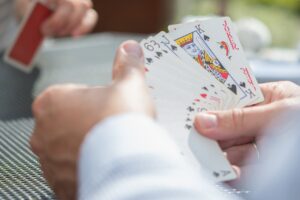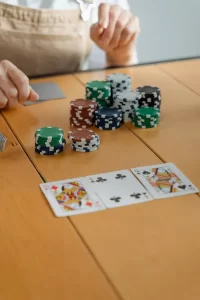The Psychology of Poker Cash Games: Leveraging Mental Edge for Profitable Play is a book that delves into the psychological aspects of playing poker cash games. It explores how understanding and utilizing the principles of psychology can give players a competitive advantage and increase their chances of making profitable decisions at the poker table. This book aims to provide insights and strategies that can help players improve their mental game, manage emotions, read opponents, and ultimately enhance their overall performance in cash games.
Understanding the Importance of Mental Edge in Poker Cash Games
Mental edge refers to the psychological advantage a player has over their opponents. It is the ability to read and understand the emotions, thoughts, and behaviors of others at the table. This understanding allows players to make better decisions, exploit weaknesses, and ultimately, win more money.
One of the key aspects of mental edge in poker cash games is the ability to control emotions. Poker is a game of highs and lows, where winning and losing can happen in an instant. Emotions such as anger, frustration, and tilt can cloud judgment and lead to poor decision-making. Players with a strong mental edge are able to stay calm and composed, making rational decisions even in the face of adversity.
Another important aspect of mental edge is the ability to read opponents. Poker is a game of incomplete information, where players must make educated guesses about the strength of their opponents’ hands. By observing their opponents’ behavior, body language, and betting patterns, players can gain valuable insights into their opponents’ thought processes. This allows them to make more accurate assessments of their opponents’ hands and adjust their own strategies accordingly.
Furthermore, mental edge in poker cash games involves the ability to bluff effectively. Bluffing is a fundamental part of the game, where players bet or raise with a weak hand in order to deceive their opponents into folding stronger hands. However, successful bluffing requires a deep understanding of human psychology. Players with a strong mental edge are able to read their opponents’ reactions and exploit their weaknesses, making their bluffs more convincing and profitable.
In addition to controlling emotions, reading opponents, and bluffing effectively, mental edge in poker cash games also involves the ability to make quick and accurate decisions. In the fast-paced environment of a poker table, players must analyze information, calculate odds, and make decisions under pressure. Players with a strong mental edge are able to process information quickly and make the best decisions in a timely manner, giving them an edge over their opponents.
Developing a strong mental edge in poker cash games is not easy. It requires practice, self-awareness, and a deep understanding of human psychology. However, the rewards can be significant. Players with a strong mental edge are able to make better decisions, exploit weaknesses, and ultimately, win more money.
In conclusion, understanding the importance of mental edge in poker cash games is crucial for profitable play. It involves controlling emotions, reading opponents, bluffing effectively, and making quick and accurate decisions. Developing a strong mental edge takes time and effort, but the rewards can be substantial. So, the next time you sit down at a poker table, remember that the cards are just a small part of the game. It is the psychological battle that truly determines who will come out on top.
Developing a Winning Mindset for Profitable Poker Cash Game Play
Developing a winning mindset starts with understanding the psychology behind the game. One key aspect is managing emotions. Poker can be an emotional rollercoaster, with players experiencing highs and lows as the cards are dealt. It is important to stay calm and composed, regardless of the outcome of a hand. Emotions can cloud judgment and lead to poor decision-making, so it is essential to keep them in check.
Another important aspect of a winning mindset is having confidence in your abilities. Believing in yourself and your skills is crucial for success in poker. Confidence allows you to make bold moves and take calculated risks. It also helps you to stay focused and make rational decisions, even in high-pressure situations. Without confidence, doubt can creep in and lead to hesitation and missed opportunities.
To develop confidence, it is important to study and practice the game. Understanding the rules, strategies, and probabilities will give you a solid foundation to build upon. Reading books, watching videos, and analyzing hands played by professionals can provide valuable insights and improve your overall game. Additionally, playing regularly and gaining experience will help build confidence in your abilities.
Discipline is another key component of a winning mindset. In poker cash games, it is easy to get caught up in the excitement and make impulsive decisions. However, successful players exercise discipline and stick to their strategies. They know when to fold, when to bet, and when to bluff. They do not let emotions or external factors influence their decisions. Developing discipline takes practice and self-control, but it is essential for long-term profitability.
A winning mindset also involves being adaptable and flexible. Poker is a dynamic game, and strategies that work in one situation may not work in another. Successful players are able to adjust their strategies based on the changing dynamics of the game. They are constantly observing their opponents, looking for patterns and weaknesses to exploit. They are willing to change gears and switch up their playstyle when necessary.
Lastly, a winning mindset requires resilience. Poker is a game of variance, and even the best players can experience losing streaks. It is important to stay positive and not let losses affect your confidence or decision-making. Instead of dwelling on past mistakes or bad beats, successful players focus on the long-term and continue to make calculated decisions. They understand that variance is a natural part of the game and that staying mentally strong is crucial for success.
In conclusion, developing a winning mindset is essential for profitable play in poker cash games. Managing emotions, having confidence, exercising discipline, being adaptable, and staying resilient are all key components of a winning mindset. By understanding the psychology behind the game and working on these aspects, players can leverage their mental edge to make profitable decisions and ultimately succeed in the game of poker.
Psychological Strategies to Gain an Edge in Poker Cash Games
One of the most important psychological strategies in poker cash games is maintaining a calm and composed demeanor. Emotions can run high in the heat of the game, and it is easy to let frustration or anger cloud your judgment. However, experienced players know that staying cool under pressure is crucial. By keeping your emotions in check, you can make rational decisions based on the information available to you, rather than being swayed by your feelings.
Another psychological strategy that can give you an edge in poker cash games is the ability to read your opponents. Poker is a game of deception, and players often try to hide their true intentions through their actions and body language. By paying close attention to your opponents’ behavior, you can gain valuable insights into their hand strength and intentions. For example, a player who suddenly becomes more talkative or fidgety may be bluffing, while a player who appears confident and relaxed may have a strong hand. By observing and analyzing these cues, you can make more informed decisions and increase your chances of success.
Furthermore, understanding and managing your own psychological tendencies is crucial in poker cash games. Each player has their own unique set of strengths and weaknesses, and being aware of these can help you exploit your opponents’ weaknesses while minimizing your own. For example, if you tend to be impulsive and easily swayed by others, you can work on developing a more disciplined approach to the game. On the other hand, if you are naturally cautious and risk-averse, you can learn to take calculated risks when the situation calls for it. By understanding your own psychological tendencies and adapting your strategy accordingly, you can maximize your chances of success.
In addition to these individual psychological strategies, there are also broader psychological concepts that can be applied to poker cash games. One such concept is the idea of game theory, which involves analyzing the strategic interactions between players. By understanding the principles of game theory, you can make more informed decisions based on the likely actions of your opponents. For example, if you know that your opponent is likely to bluff in a certain situation, you can adjust your strategy accordingly to exploit this weakness.
In conclusion, the psychology of poker cash games is a fascinating and complex subject. By leveraging psychological strategies such as maintaining a calm demeanor, reading your opponents, understanding and managing your own psychological tendencies, and applying broader concepts like game theory, you can gain a significant edge in the game. While luck will always play a role in poker, it is the players who can effectively leverage their mental edge who will ultimately come out on top. So, the next time you sit down at the poker table, remember to not only focus on the cards, but also on the psychological battle that is taking place.
The Role of Emotional Intelligence in Successful Poker Cash Game Play
The game of poker is not just about the cards you hold or the bets you make. It is a complex battle of wits, strategy, and psychology. In order to be successful in poker cash games, players must not only have a solid understanding of the game itself, but also possess a strong mental edge. Emotional intelligence plays a crucial role in achieving profitable play.
Emotional intelligence, often referred to as EQ, is the ability to recognize, understand, and manage our own emotions, as well as the emotions of others. In the context of poker, this means being able to control one’s emotions and make rational decisions, even in high-pressure situations. It also involves being able to read and interpret the emotions and body language of opponents, giving players an edge in predicting their moves.
One of the key aspects of emotional intelligence in poker cash games is the ability to manage tilt. Tilt refers to a state of emotional frustration or anger that can cloud a player’s judgment and lead to poor decision-making. It often occurs after a bad beat or a series of losses. Players with high EQ are able to recognize when they are on tilt and take steps to regain control of their emotions. This might involve taking a break from the game, practicing deep breathing exercises, or engaging in positive self-talk to refocus their mindset.
Another important aspect of emotional intelligence in poker cash games is the ability to read and interpret the emotions and body language of opponents. This skill, often referred to as “poker tells,” can give players valuable insights into the strength or weakness of their opponents’ hands. For example, a player who is nervously tapping their fingers or avoiding eye contact may be bluffing, while a player who is sitting up straight and making direct eye contact may have a strong hand. By paying attention to these subtle cues, players with high EQ can make more informed decisions and increase their chances of winning.
In addition to managing tilt and reading poker tells, emotional intelligence also plays a role in managing bankroll and making strategic decisions. Players with high EQ are able to set realistic goals and stick to a budget, avoiding the temptation to chase losses or play at stakes that are beyond their means. They are also able to adapt their strategy based on the emotional state of their opponents, taking advantage of their weaknesses and adjusting their own gameplay accordingly.
In conclusion, emotional intelligence is a crucial factor in successful poker cash game play. It allows players to manage tilt, read poker tells, and make strategic decisions based on the emotions of their opponents. By developing and leveraging their EQ, players can gain a significant mental edge and increase their chances of profitable play. So, the next time you sit down at the poker table, remember that it’s not just about the cards – it’s about the psychology behind the game.
Enhancing Focus and Concentration for Optimal Performance in Poker Cash Games
One of the first steps in enhancing focus and concentration is to create a conducive environment for playing poker. This means finding a quiet and comfortable space where distractions are minimized. It’s important to eliminate any potential interruptions, such as turning off notifications on your phone or closing unnecessary tabs on your computer. By creating a dedicated space for playing poker, you can minimize external distractions and fully immerse yourself in the game.
Another key aspect of enhancing focus and concentration is managing your mental state. It’s essential to approach each poker cash game with a clear and focused mind. This can be achieved through various techniques, such as deep breathing exercises or meditation. Taking a few moments to center yourself before starting a game can help calm your mind and improve your ability to concentrate.
In addition to managing your mental state, it’s important to set specific goals for each poker cash game. By having a clear objective in mind, you can maintain focus and avoid getting distracted by irrelevant factors. Whether your goal is to win a certain amount of money or to improve your decision-making skills, having a target can help keep you motivated and engaged throughout the game.
Furthermore, it’s crucial to develop a routine that supports your focus and concentration. This can include activities such as reviewing hand histories, studying poker strategy, or engaging in mental exercises that sharpen your analytical skills. By incorporating these activities into your routine, you can train your mind to stay focused and make better decisions during poker cash games.
Another strategy for enhancing focus and concentration is to practice mindfulness during gameplay. Mindfulness involves being fully present in the moment and paying attention to your thoughts, emotions, and physical sensations. By practicing mindfulness, you can become more aware of any distractions or biases that may affect your decision-making process. This heightened self-awareness can help you make more rational and calculated moves, ultimately leading to more profitable play.
Lastly, it’s important to take breaks when needed. Poker cash games can be mentally demanding, and it’s crucial to give yourself time to recharge. Taking short breaks between sessions or even during longer sessions can help prevent mental fatigue and maintain focus. Use these breaks to relax, clear your mind, and come back to the game with renewed energy and concentration.
In conclusion, enhancing focus and concentration is essential for profitable play in poker cash games. By creating a conducive environment, managing your mental state, setting goals, developing a routine, practicing mindfulness, and taking breaks, you can leverage your mental edge and improve your overall performance. Remember, poker is not just a game of cards but also a game of the mind. Understanding the psychology of poker cash games and leveraging the mental edge can greatly contribute to profitable play. By developing skills such as emotional control, reading opponents, and managing tilt, players can make more informed decisions and increase their chances of success. Additionally, being aware of cognitive biases and employing strategies to exploit them can provide a significant advantage. Overall, combining a solid understanding of the game with psychological insights can lead to improved performance and profitability in poker cash games.




